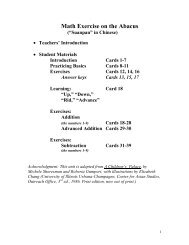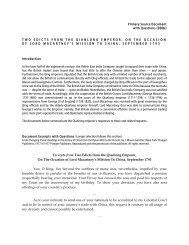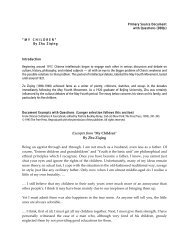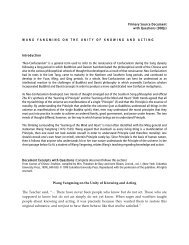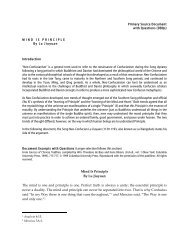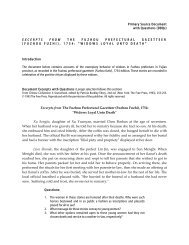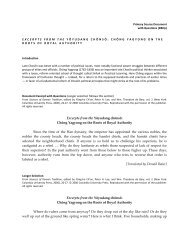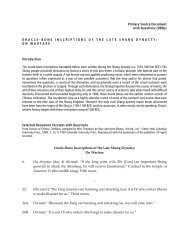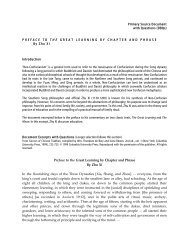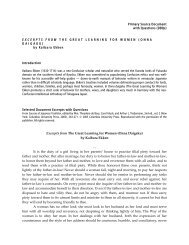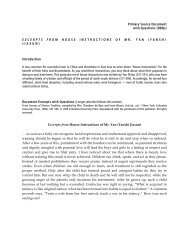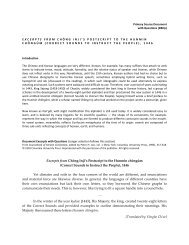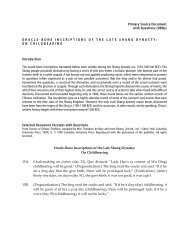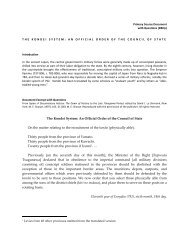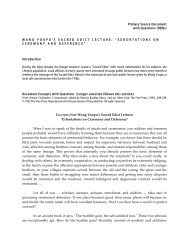EXCERPTS FROM "MY OLD HOME" - Asia for Educators - Columbia ...
EXCERPTS FROM "MY OLD HOME" - Asia for Educators - Columbia ...
EXCERPTS FROM "MY OLD HOME" - Asia for Educators - Columbia ...
Create successful ePaper yourself
Turn your PDF publications into a flip-book with our unique Google optimized e-Paper software.
Primary Source Document<br />
with Questions (DBQs)<br />
E X C E R P T S F R O M " M Y O L D H O M E "<br />
B y L u X u n<br />
Introduction<br />
Beginning around 1917, Chinese intellectuals began to engage each other in serious discussion and debate on<br />
culture, history, philosophy, and related subjects — all with an eye to the bigger problem of China's weakness and<br />
the possible solutions to that problem. This period of intellectual debate, labeled the May Fourth Movement, lasted<br />
until around 1921.<br />
Literature played a major part in the lives and the intellectual debates of the Chinese intellectuals of the May Fourth<br />
period and on into the 1920s and 1930s. Writing in the vernacular (rather than in the stilted and inaccessible classical<br />
<strong>for</strong>ms that had been the "proper" way of writing), a new generation of Chinese authors tackled social and political<br />
issues in essays, short stories, novels, and satires.<br />
Lu Xun (1881-1936) was the most important fiction writer of his time. Born in 1881 and educated in China and Japan,<br />
Lu Xun gave up the study of medicine to become an author.<br />
The story below is set in 1920 on the occasion of Lu's return to his old home in Zhejiang Province.<br />
Document Exce rpts with Que stions (Longer selection follows this section)<br />
From Chinese Civilization: A Sourcebook, edited by Patricia Buckley Ebrey, 2nd ed. (New York: The Free Press, 1993), 354-359.<br />
© 1993 The Free Press. Reproduced with the permission of the publisher. All rights reserved. NOTE: Originally appeared in<br />
Selected Stories of Lu Hsun, edited by Yang Hsien-yi and Gladys Yang (Peking: Foreign Language Press, 1960).<br />
<br />
Excerpts from ʺMy Old Homeʺ <br />
By Lu Xun <br />
<br />
[In this first set of excerpts, Lu Xun describes the first time he met Runtu — when they were both small <br />
boys. Runtuʹs father had brought Runtu along to assist with the preparations <strong>for</strong> the Lunar New Year <br />
festivities at the house of Lu Xunʹs parents. Runtu, who lives by the sea, tells the young Lu Xun about <br />
trapping birds, collecting shells on the shore, and defending the watermelon crop from badgers, <br />
hedgehogs, and an unidentified wild animal known as a zha.] <br />
<br />
Our family had only one part‐time laborer. … And since there was so much to be done, <br />
he told my father that he would send <strong>for</strong> his son Runtu to look after the sacrificial vessels. … <br />
<br />
When my father gave his consent I was overjoyed, because I had long since heard of <br />
Runtu and knew that he was about my own age. …
Primary Source Document with Questions (DBQs) on<br />
EXC ERPTS FRO M " <strong>MY</strong> <strong>OLD</strong> HOME," BY LU XUN<br />
… He was very shy, and I was the only person he was not afraid of. When there was no <br />
one else there, he would talk with me, so in a few hours we were fast friends. <br />
<br />
Runtuʹs mind was a treasure‐house of … strange lore, all of it outside the ken of my <br />
<strong>for</strong>mer friends. They were ignorant of all these things and, while Runtu lived by the sea, they <br />
like me could see only the four corners of the sky above the high courtyard wall. <br />
<br />
[After the month of the Lunar New Year festivities, Runtu went back to his home by the seashore. Lu Xun <br />
never saw him again until the 1920 visit home which is the subject of the story. The following set of <br />
excerpts tell of that meeting between the two, now both middle‐aged men.] <br />
<br />
One very cold afternoon, I sat drinking tea after lunch when I was aware of someone <br />
coming in. … The newcomer was Runtu. … He had grown to twice his <strong>for</strong>mer size. His round <br />
face, once crimson, had become sallow and acquired deep lines and wrinkles; his eyes too had <br />
become like his fatherʹs, the rims swollen and red. … <br />
<br />
Delighted as I was, I did not know how to explain myself, and could only say: “Oh! Runtu <br />
— so itʹs youʺ … <br />
<br />
He stood there, mixed joy and sadness showing on his face. His lips moved, but not a <br />
sound did he utter. Finally, assuming a respectful attitude, he said clearly: ʺMaster!ʺ <br />
<br />
Questions:<br />
<br />
1. Why are Lu Xun and Runtu so awkward at their second meeting as grown<br />
men<br />
2. What does the story reflect about social structure in rural China in the 1920s<br />
3. We see the encounter from Lu Xun's perspective. How might Runtu see the<br />
same encounter<br />
<br />
<br />
<strong>Asia</strong> <strong>for</strong> E duca tors l <strong>Columbia</strong> University l http ://afe.easia.columbia.edu Page 2 of 2



